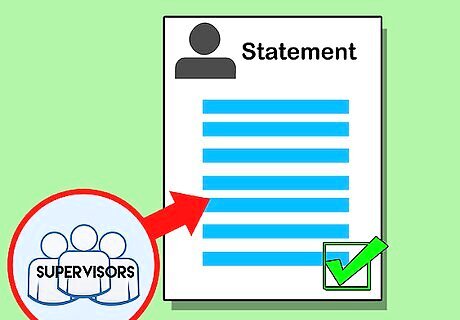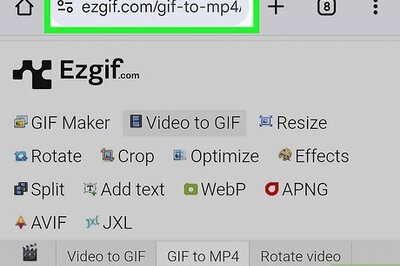
views
X
Research source
The concept most often comes up in employment law, when an employee files a wrongful termination lawsuit. Implied contracts are extremely difficult to prove, but generally, a court will find an implied contract if an employer made promises of job security and you relied on those promises.[2]
X
Trustworthy Source
National Conference of State Legislatures
Bipartisan, nongovernment organization serving the members of state legislatures and their constituents
Go to source
Interpreting Employee Handbooks

Get copies of all employee handbooks and policy memos. To find an implied contract, all of the written documents that outline an employer's policies and procedures must be scrutinized closely. Pay close attention to the sections of the handbook that outline performance expectations and employee discipline. These sections are most likely to create an implied contract. For example, suppose the employee discipline section indicates that a particular procedure must be followed to discipline an employee for failing to follow the company's rules and policies, and that procedure wasn't followed when you were terminated. You have an argument that the section created an implied contract that no one would be fired except through that procedure. Sections on performance expectations also can create implied contracts. For example, an employee handbook that states all employees in your position are responsible for creating at least 50 widgets a day or they will be terminated arguably creates an implied contract that you can expect continued employment as long as you create 50 widgets a day.

Highlight disclaimer language. Employers often put disclaimers or other provisions in handbooks emphasizing that despite any language to the contrary, all employment is considered at-will employment. Disclaimer language doesn't necessarily negate an implied contract, but courts will take it into consideration when deciding whether your belief that you had some guarantee of continued employment was reasonable. Whether the disclaimer controls and supersedes any language to the contrary may depend on the prominence of the disclaimer in comparison to statements implying job security. For example, if your employee handbook refers throughout to "permanent" employees and outlines a disciplinary procedure described as the exclusive means of terminating employees, this would probably outweigh an at-will disclaimer in small print at the bottom of the last page. You also should look for any statements that the written policies in the handbook supersede any oral statements made by managers or supervisors. This sort of disclaimer typically prevents you from finding an implied contract if, for example, your manager tells you that based on your performance, you have a job for life.

Look for promises or guarantees. Statements about job security, performance review procedures, and even benefits can including wording that implies continued employment is promised or guaranteed. Keep in mind that implied contracts typically are created by the employer unintentionally, but they are still just as binding as if you had signed a written contract. Typically you won't find anything explicit in your employee handbook, since most employers know better than to guarantee employment outright. However, statements such as "after your probationary period you will become a permanent employee" could be construed as promises. Similarly, a statement within the description of the employer's disciplinary procedure states that employees will not be terminated without two weeks' notice could be interpreted as an implied contract requiring such notice in all termination situations – not just those occurring because of disciplinary infractions. Promises may be implied in conditional language. For example, a handbook provision that states "if you commit any of the following infractions you are subject to immediate termination" could be understood to mean that those infractions are the only reasons anyone would be fired without warning or opportunity to correct the problem.

Define words and terminology used to describe the employment relationship. When employees are described using certain words such as "permanent," courts may find an implied contract. Many employers put new hires on a 90-day probationary period. However, calling employees who have passed probation "permanent" or "long-term" can set the stage for an implied contract. Offering permanent employment implies that as long as people continue to do their job and follow company rules and policies, they won't be fired or laid off.
Analyzing Employer Behavior

Calculate how long you have worked for the company. Although longevity by itself does not create an implied contract, established tenure with a company can strengthen the argument that your employer guaranteed continuing employment provided you met expectations. Coupled with longevity, additional statements by managers or supervisors may create an implied contract, if you can demonstrate that there was a mutual understanding that you would continue to have a job at that company. For example, suppose after a round of layoffs your supervisor tells you, "You've been working here so long, you don't have to worry about losing your job – I'll probably get laid off before you do!" That sort of statement could be interpreted as creating an implied contract, particularly if your supervisor has a written contract himself. Your supervisor is implying that you have more job security than he does.

Compile all of your performance reviews. You can find an implied contract in a long history of positive performance reviews, depending on what was said over the course of those reviews. Keep in mind that in most situations, working somewhere for a long time, even coupled with positive performance reviews, typically is not enough to create an implied contract. However, statements made on written review forms, or during the context of the review itself, may create an implied contract. For example, if you've received your fifth straight positive performance review, and your manager says "Employees like you will always have a place in this company," that could be construed as an implied contract. Any implied contract created because of exemplary performance generally exists only so long as you keep up your end of the bargain. The contract created typically is interpreted as a conditional one. If your performance slumps, or you get in trouble for some other reason, the implied contract no longer applies to you.

Document comments from supervisors. Even off-hand comments made in casual conversation can be construed to create an implied contract in some situations. For example, suppose your supervisor sees you in the break room while you're eating lunch and pauses to compliment your work that morning, saying "you certainly have a long future with this company." Provided you continue to perform at the same level, this could be considered an implied contract.

Establish your reliance on statements from supervisors. Courts are more inclined to find an implied contract if statements from your managers or supervisors led you to form a reasonable belief that you would not be fired. Your reliance must be reasonable considering all the circumstances of your relationship with your employer. Typically, if you're required to sign regular acknowledgements that your employment is at-will, you won't be able to claim you reasonably relied on a statement from a supervisor guaranteeing you job security – no matter how unequivocal that supervisor's statement was. Some comments may be less direct but still create an implied contract. For example, if your supervisor talks to you about working on a project that won't start for three months, it would be reasonable for you to believe you'd still be working with the company in three months.
Evaluating Employer Policies

Assess the employer's hiring procedure. Statements on applications or employment offers can be construed as creating an implied contract. If the offer letter includes a statement that the employment offered is at-will, most courts will take this to mean that no implied contract is created, regardless of anything said by the employer afterward. Things supervisors, managers, or recruiters say to potential employees to get them to take the job also may be considered implied contracts. For example, if your employer told you before you accepted his job offer that you would only be fired if you failed to meet your production quota, this could be considered an implied contract.

Find out how employees understand the discipline policy. Often an employer's discipline policy creates the impression that employees can only be fired for the reasons they can be disciplined. A discipline policy also may create an implied contract if it is written in such a way that employees believe they can only be fired through that policy. For example, if your employer has a "three strikes and you're out" policy in which you are terminated after three warnings, that policy may create a reasonable belief in employees that they cannot be fired unless they've first received three warnings.

Review reasons other employees were terminated. Sometimes an implied contract can be found if an employer consistently only fires employees for violating specific policies or failing to meet production standards. For example, if an employer who has never fired an employee except for good cause, you may have a case for an implied contract if you are suddenly fired for no reason.















Comments
0 comment